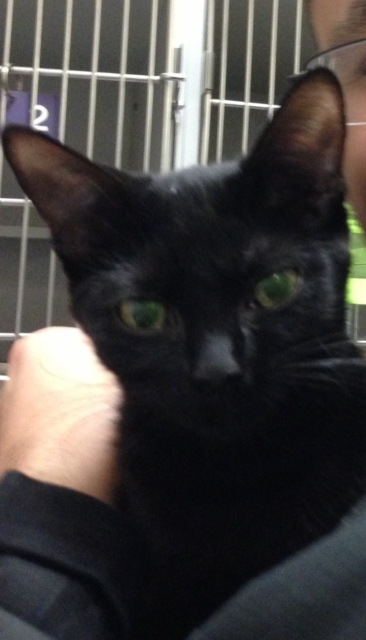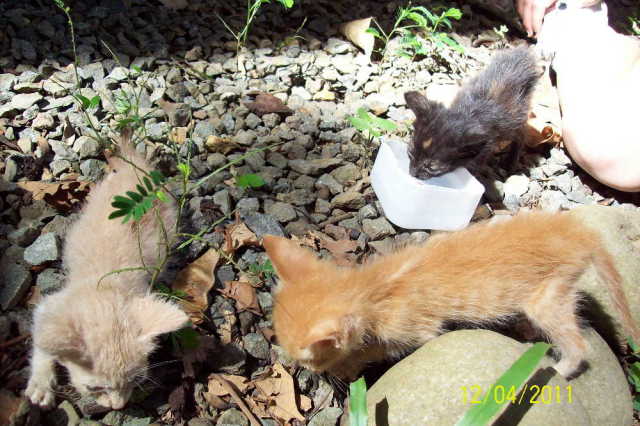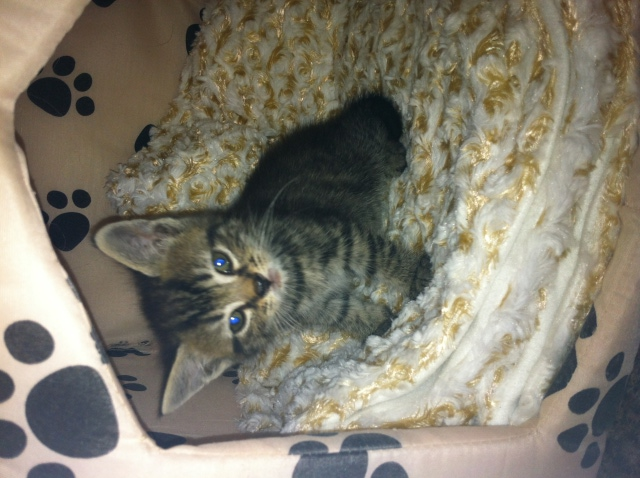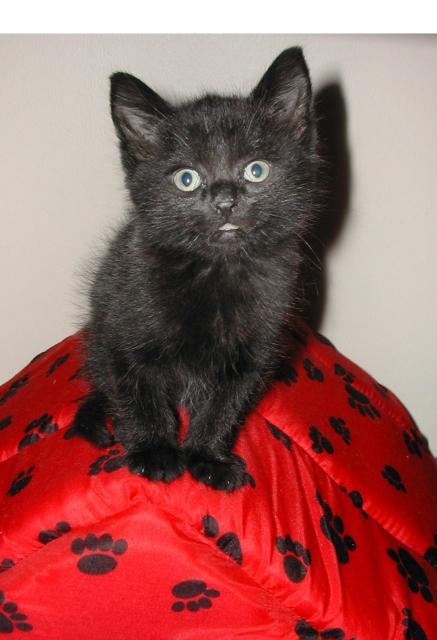QuestionA few days ago my husband and I adopted 2 female tabby kittens (one a polydactyl) about 6 months of age from a local shelter - Salem Friends of Felines. They take in cats, get their shots all up to date, spay/neuter, and micro-chip all cats they receive. The two kittens we adopted were classified as semi-feral and had been in foster care for two months after being found and then in the shelter for the next 2 months. We were told to keep them in a quiet room of their own with limited furniture (essentially less things for them to hide behind) for at least the first week we got them. They told us to spend time with the kittens, sitting/laying on the floor with them, gently petting them, etc... until they got used to us. We have followed instructions for the three days we have had them, but I'm worried that perhaps we are moving too fast, especially by petting them, so I wanted your advice.
Here is the room set-up and my routine: In the past year we've been renovating our house. The first floor is done and we won't be moving to the second floor for at least 1.5yrs. So, the only space that didn't have things for the kittens to hide behind is this big open hallway/room at the top of the stairs. It's like a room because the stairs have a door at the bottom and all rooms upstairs have doors. The only thing I've noticed that might be a problem is that in our house all our floors are wood and creaky. So, when we go up the stairs into the room, the floor creaks loudly and I think this might frighten the kittens before we even enter the room. In their room they have an open litter box (i took the top off because Varuca kept hiding in it), a scratching post, food/water, a variety of toys, and a cozy bed.
I go into their room between 7-8am and sit with them for about an hour. When I first enter the room, the kittens are usually both in their bed in the corner, most of the time Varuca (the polydactyl) will get up and "slink" to her "hiding spot" in the litter pan. Mirani will stay in bed and so I'll go to her first if Varuca went into hiding. I always try and make myself as little as possible by laying/sitting next to their bed. I'll reach out my hand so Mirani can smell it and then I start petting her, especially around the neck, ears, throat area. She will cower and freeze for a minute but then relaxes and starts purring. If Varuca is still in bed and didn't go hide, I'll do the same with her and she'll have the same reaction as Mirani but soon will be purring. They'll both be in bed purring but as soon as I get up to leave they both get tense and wide-eyed again. Usually I use a laser light to get them to play (I've heard Varuca playing with a little ball but they won't ever do that when I'm in the room). They chase the light around the room - always avoiding getting close to me. It seems Varuca is more skittish than Mirani, but as soon as they both get seemingly comfortable with me when I pet them the next time I come into the room they are all tense and scared again. I go into the room several times a day for good periods of time because I work mostly at home. I'll bring my books or whatever I'm working on into the room and just sit doing my own thing. The only things they do while I'm in the room though is sleep and eat/drink and they always avoid me.
Should I keep petting them even though they cringe at first every time? They seem to like it after a minute because they won't stop purring but then they turn around and cringe again as soon as I go down the stairs and when I come back in. I've tried holding Mirani and she does fine once she's in my lap and being petted, but once I stop petting her she goes back to her safe spot - her bed. I haven't dared trying to hold Veruca yet cause she seems double the amount of skittish Mirani is.
I saw on past posts on semi-feral kittens that you suggested Bach's Flower Remedies and I think I'll try that. Any other suggestions for what I could do? What do you think about the creaky stairs - I could move them to the living room but we are in and out of there quite a bit and I thought that might disrupt their image of the other room being safe?
AnswerEliza,
With these kitties it's very important to take your time and be patient with them, if you push them too far too fast then there's a chance that you'll end up creating more fear and anxiety in these kitties. Homeopathic remedies including the Bach flower remedies are certainly well worth trying, you may want to start out with Rescue Remedy since it's specifically designed to help calm and reassure and I've found it to be helpful when working with fearful, anxious or traumatized cats of any age. I've taken the liberty of breaking down Rescue Remedy so that you can have a better understanding of how the individual remedies in Rescue Remedy are working together towards a common goal with these kitties. The five remedies in Rescue Remedy are:
Star of Bethlehem: This remedy is for any kind of trauma, it can be used to alleviate stress and anxiety caused by new environments or even something as simple as being left alone for awhile confined at home or at a vet hospital.
Clematis: This is helpful for keeping these fearful kitties grounded so they're better able to learn that your intentions are good and you mean no harm. Sometimes fear can make it more difficult for cats to fully absorb these simple lessons.
Rock Rose: Treats terror and panic. Fear doesn't dissolve and break down naturally within the body, this remedy helps to remove serious fear and anxiety. In pets that simply need a bit more courage to face life Rock Rose can also help to nuture any courage that's naturally within a cat's resources.
Impatiens: This remedy is meant to help very nervous animals, it also helps to alleviate pain whether it's physical, psychological or emotional in origin.
Cherry Plum: Cherry Plum helps to maintain control, for instance if fear is controlling a cat's behavior this remedy is helpful to prevent fear, anxiety, terror and other negative emotional states from overwhelming and controlling that pet's behavior. Since these fur kids are new to your household it's quite possible that they've regressed a bit in terms of their behavior around people just as a result of the stress of moving into a new home with new routines, people and experiences.
If you are very interested in using homeopathy or other alternative treatments (ranging from massage to acupuncture, to veterinary chiropractic care and light therapies to name a few of your options) to help your cats with physical and behavioral issues throughout their lives you may want to seriously consider finding a homeopathic vet or a holistic vet in your area. One good way to find a vet who is open to the use of alternative therapies is by word of mouth, ask around, people will often provide accurate information about the quality of care their pets have received with a particular veterinarian or veterinary practice. In addition to the use of homeopathic remedies like Rescue Remedy there are a few other things you may want to consider in order to help these cats become more comfortable with you and other people in your household.
I have a slightly different philosophy than the folks running the rescue that you adopted these kitties from and it's come from years of observing cat behavior and the different stages of development that all cats must go through in order to be well adjusted, happy and sane cats. Over the years I've found it much better to help a cat feel as though s/he is the one who is making the decision to interact with me rather than forcing myself into his/her space and pushing physical interaction by touching them when they're not ready to be handled. I've found that moving too quickly can sometimes result in some fairly nasty bites and scratches with truly fearful, traumatized cats. When handling kittens who are obviously unsure and fearful it's never too late to start over and build their trust and confidence, once they know they can trust you they will come to you on their own which is incredibly rewarding (sometimes cats may need some positive reinforcement or a special treat as an incentive, but it's well worth the investment).
Some folks use the terms feral and stray interchangeably, unfortunately they're miles apart in terms of their actual meaning. Stray cats were born into an environment where they were socialized and handled by people often enough that they learned to see people as either good or bad companions. At some point in a stray cat's life s/he was abandoned by his/her caregivers to fend for him/herself, usually when this happens the cats are still intact which leads to way too many litters of homeless kittens who face a fairly short and very hard life (average life expectancy for a feral cat who doesn't receive any human help is 18 months to 2 years). Feral cats happen when a stray cat has kittens, these babies never receive socialization with humans during the first weeks of life and as a result they see humans as large, scary predators. Part of why stray and feral cats are so wary around people is because of the fact that way too many people chase strays away from their yard so that they don't have to take on the responsibility of providing care for them, in some cases people turn to deliberate acts of cruelty to keep cats off of their property (not too long ago I got a question from a lady whose neighbor shot her cat, fatally injuring him) and for others cruelty happens as a result of ignorance.
After giving your situation some thought I've come up with a few recommendations that I think might be useful in your situation:
1) When kittens are born they are born blind and deaf, their survival actually depends on their sense of smell for the first 7-10 days of life so this is naturally the sense you want to make use of when cats are frightened. You can help the cats become more comfortable with your scent simply by providing them with a couple of dirty t-shirts that you've worked out in - you can simply place them in the kitty beds you have for these guys which will allow them to check your scent out on their own terms when they're comfortable doing so.
2) You described going into the kittens' room with a book, the laptop or some other activity to keep your focus off of the kittens, this is excellent and I'd recommend that you do it as often as possible for as long as possible. Since the kittens will eat and drink when you're in the room their anxiety levels aren't completely stretched to the limit - a terrified animal won't eat, drink or relieve themselves in your presence. The twist that I'd like to add is that for the moment you should bring along something extra special and yummy as a means of luring the kittens out of hiding that you can use as a reward for having them approach you on their own. I've found that salmon, tuna or meat/broth based baby foods score high on the list of treats that most cats really enjoy so these are a safe bet. What you'll want to do is to sit the plate containing the treat just out of your reach (say 1 1/2-2 feet out of reach) for the first several days each time you go into the kitten room to spend quiet time with them while you're distracted doing something else, this will allow them to feel safer when they come closer to you to eat their special treat because they'll know that they can get away from you before you could catch them. Each adult member of the household that will be interacting with the kittens should try and do the same thing as often as possible to ensure that the kittens associate something positive with each of their human family members. At this point if you have young children in the house it's best to keep them out of the kitten's temporary home since children are less predictable than adults and generally much noisier.
3) Keep your voice as low as possible when you're in the kitten's room, this will help them get more comfortable with hearing your voice and if you reward them every time that they respond well to your voice they will learn to come running towards you when you speak rather than finding a place to hide themselves.
4) Provide these kittens with a couple of hiding places, a couple of cardboard boxes that can be closed on all four sides with small doors cut into them will work nicely. Allowing the kittens to retreat to places where they feel safest when they need to will mean that they'll be much more comfortable and confident in your presence because they know they have safe places to escape to. If you find ways of rewarding the kittens with special food items like chopped chicken breast or other lean muscle meats along with slowly integrating play and calm praise (kept low key and quiet, but positive) when the kittens come out of hiding and approach you they'll soon get the idea that interacting with you on their own terms means they'll get a yummy treat. Later on the kittens will most likely feel comfortable enough to enjoy interactive playtime with toys such as long pieces of string (this should never be given to the kittens at any stage of their life if you aren't there to supervise, you don't want anyone to swallow it and end up needing major surgery to remove it when the string obstructs the kitten's intestinal tract), kitty teases (too many styles to name), kitten mittens and other toys which will help to encourage a stronger bond between the human and feline members of the household. You can also continue to provide the kittens with toys meant for independent play such as catnip mice, crinkle balls, feathered toys and any other safe, fun toys. Our cats have always gotten a great kick out of small ping pong shaped balls made from foam - they bounce unpredictably which means that cats like them, but they're quiet which means that the humans also like them even when the kitties play with them at 3 am.
5) Everyone needs something that makes them feel useful, cats are no different than we are that way. They need entertainment so if it's at all possible provide your kittens with entertainment that will help to satisfy their need to hunt. You can hang a bird feeder outside the window in your kittens' room so they can watch small songbirds eating, some cats get a real kick out of squirrels which most areas have and anything with nuts of any kind or peanut butter tends to attract them. If your kitten room doesn't have a window sill that's big enough for the kittens to jump onto and watch the birds, squirrels and other wildlife then you might want to consider doing treasure hunts in the kitten room with treats and toys to help keep the feline minds occupied. You can also check out the CatSitter DVD series, this is a video series designed just for cats and each volume has great video of prey animals such as mice, squirrels and songbirds in different environments. This is an excellent way to entertain the cats while you're out of the house for a couple of hours since the DVD is set to restart itself when it reaches the end of the footage.
I wish you the best of luck with these kittens, it sure sounds like you're willing to work with them and I think they'll come around fairly quickly, in no time at all you'll have a strong bond with your rescued kittens. I'd certainly be interested to hear how your kittens are progressing in terms of their comfort levels around you, I'd really enjoy hearing how these kittens are doing so please feel free to send updates my way if you've got time. If you have any further cat related questions or concerns, please feel free to contact me again and I will do my absolute best to help you out.

 Bombay at local pound??!
Question
Wide set eyes Kitten
Hi I have a
Bombay at local pound??!
Question
Wide set eyes Kitten
Hi I have a
 Orphaned baby kittens in the rainforest
Question
kittens
Hello,
My wife and I are volunteers in
Orphaned baby kittens in the rainforest
Question
kittens
Hello,
My wife and I are volunteers in
 Bengal kitten?
Question
Pic Picture
Hello, I was wonderi
Bengal kitten?
Question
Pic Picture
Hello, I was wonderi
 kittens nails
QuestionQUESTION: Hi Pati,
Its me again Xris. I seek y
kittens nails
QuestionQUESTION: Hi Pati,
Its me again Xris. I seek y
 2 sibling cats. one of the brothers just passed.
Question
Their last day togethe
how should i dea
2 sibling cats. one of the brothers just passed.
Question
Their last day togethe
how should i dea